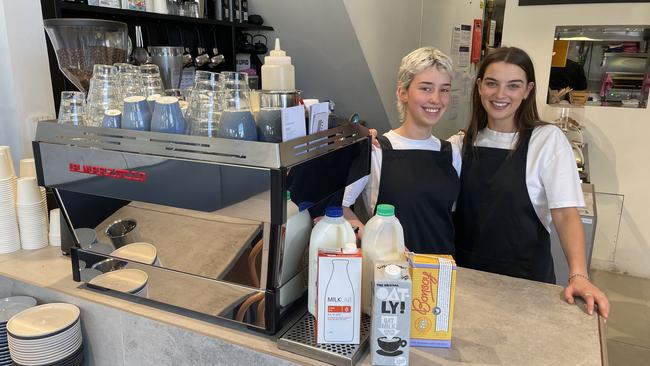Oat, almond milk coffee sales increase as Australians opt for alternatives
What percentage of coffee drinkers opt for almond or soy over dairy milk? The trends may surprise you.

A proper cup of coffee is not complete for many without a splash of milk.
But the type of milk or plant-based alternative that goes into the morning cuppa is changing as caffeine fiends become more discerning about their lactose (or indeed fructose) options.
Kupid Espresso, based in Melbourne’s inner eastern suburbs is managed by Lara Norton,. She, said while dairy milk is still the favourite, customers are very preferential about their milk choices.
“I would still say more than 50 per cent of the coffees are regular milk whether that’s skinny or full cream,” Ms Norton said.
“Out of the three (alternative) milks we use — which are soy, oat and almond — almond is probably our most popular here. Each week we order about 12 crates of cows milk, six boxes of soy milk and eight boxes of almond.
Also based in Melbourne’s inner east, Emporio Coffee Roasters have been making specialty coffee for just over 20 years.
Management have noticed a distinct shift in the variety of milk demanded by their customers over the years.
The family-owned business was first set up in Ascot Vale in Melbourne’s northwest before moving to Hawthorn in Melbourne’s inner east in 2000, where they found a different customer demographic changed their milk orders.
Emporio management say milk coffee orders now roughly split into 70 per cent from traditional dairy with plant-based alternative milk.
While soy milk used to be the go-to milk alternative, both Emporio Coffee Roasters and Kupid Espresso agree it has given way to almond and oat milk as the more favoured alternative milk choices.
“People have started to move off soy milk purely because a lot of soy milks aren’t made for barista use so they’re harder to work with for coffee,” Ms Norton said.
Oat milk sales have ballooned both in Australia and across much of the western world in recent years.
The data firm Nielsen reports that oat milk sales in the United Kingdom more than doubled to £73 million last year.
British supermarket Waitrose reported that online searches for “oat milk” were up 210 per cent on the previous financial year, with sales of oat milk drinks up 113 per cent
Closer to hone, a recent shortage of Swedish oat milk brand Oatly in Victoria forced Kupid Espresso to switch brands for a period of time.
“We found there was quite a big difference when we swapped brands and all of our customers preferred the Oatly brand of oat milk when we went back to it,” Ms Norton said.
The latest domestic milk sales figures from Dairy Australia show a slight contraction in the past 12 months after reach dizzying heights at the start of the coronavirus pandemic.
More than 1.82 billion litres of milk was sold nationwide in March 2021, the latest surveyed month, compared to 1.86 billion in March 2020. Most of the decline occurred in the low-fat milk category.
MORE


